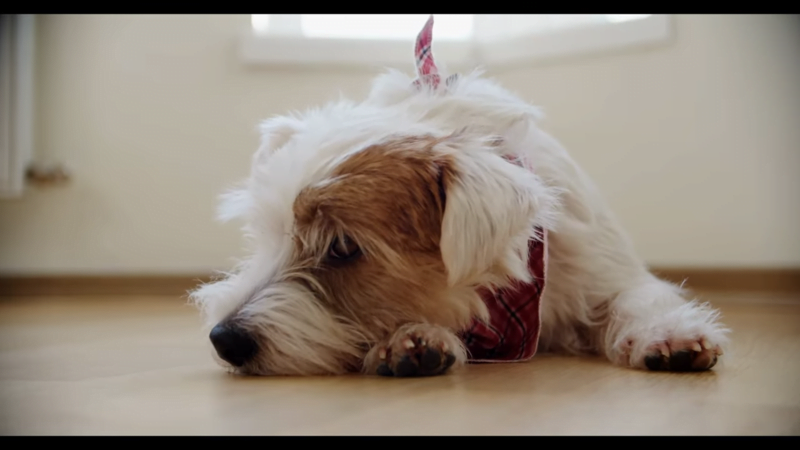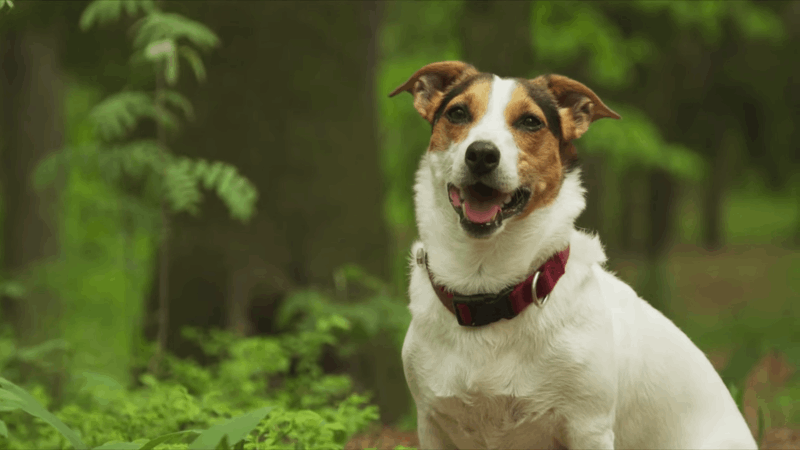No products in the cart.
Are you concerned about ringworm in dogs? Ringworm is a common fungal infection that can affect our furry friends, causing discomfort and skin issues. For dogs to be healthy, it is essential to comprehend the origins, signs, and available treatments for ringworm.
In this blog, we will explore the ins and outs of ringworm in dogs, providing you with essential knowledge to recognize and address this contagious condition. We will also help you navigate the world of ringworm in dogs and make informed decisions for CBD oil dogs.
Ringworm in Dogs and the Importance Things to Consider

A fungal infection that affects the skin, hair, and occasionally the nails is ringworm in dogs, also known as dermatophytosis. It is an infectious disease that can spread to both people and other animals. To stop the infection from spreading and to provide the affected dog some respite, prompt diagnosis and treatment are crucial.
To guarantee the infection clears up completely and to ward off any potential repercussions, regular observation and follow-up appointments with the veterinarian are required.
Ringworm Symptoms in Dogs?
Here are some common symptoms of ringworm in dogs you should consider
- Circular lesions: One of the most recognizable signs of ringworm is the presence of circular, raised, or scaly lesions on the dog’s skin. These lesions may be red, inflamed, and may have a more defined border, while the center can appear to be healing. Hair loss commonly occurs within these lesions, giving them a characteristic “ring” appearance.
- Patchy hair loss: Ringworm can cause patchy areas of hair loss on the dog’s body, particularly on the head, ears, tail, and paws. These areas may be itchy, and the skin can appear inflamed or crusty.
- Dull or brittle coat: Dogs with ringworm may have a dull or brittle coat. The hair in affected areas may break easily and have a stubbled appearance.
- Itching and irritation: Ringworm can cause itching and discomfort in dogs, leading to excessive scratching or licking of the affected areas. This can further contribute to hair loss and skin damage.
- Scaling and crusting: Infected skin may develop scaling, crusting, or flaking, especially around the edges of the lesions. These flakes may contain fungal spores, which can increase the infection’s contagiousness.
- Secondary bacterial infections: Dogs with ringworm are more prone to developing secondary bacterial infections due to the compromised skin barrier. Signs of a secondary infection may include increased redness, swelling, oozing, or a foul odor.
It’s crucial to remember that each dog will experience symptoms differently, both in terms of severity and appearance. A veterinarian should be consulted for a correct diagnosis and course of treatment if you suspect your dog may be suffering from ringworm because not all infected dogs exhibit apparent signs.
What Causes Ringworm in dogs?
Ringworm in dogs is caused by a group of fungi called dermatophytes. The most common species of dermatophytes that cause ringworm in dogs include Microsporum canis, Microsporum gypseum, and Trichophyton species. These fungi can be found in soil, on diseased animals, or in contaminated objects like bedding, grooming equipment, or furniture. They flourish in warm, humid settings.
Direct contact with an infected animal, such as skin-to-skin contact or exchanging contaminated things, can result in the spread of ringworm. In addition, dogs can get ringworm from the environment, particularly if they come in contact with soil or objects that contain fungus spores on them.
Puppies and dogs with weakened immune systems are more susceptible to developing ringworm. Stress, malnutrition, underlying health conditions, or certain medications can compromise the immune system, making dogs more vulnerable to fungal infections.
It’s crucial to remember that even while ringworm is more frequent in dogs, it can harm both people and other animals. In order to stop the spread of ringworm, it is essential to practice proper hygiene, groom regularly, and keep an atmosphere clean.
How Long Does Ringworm Last in Dogs?
Several variables, such as the immunological response of the particular dog, the severity of the infection, and the efficacy of the treatment, might affect the length of time that ringworm in dogs lasts. In general, ringworm in dogs can take several weeks to months to resolve completely.
With appropriate treatment and management, mild cases of ringworm may start to show improvement within a few weeks. However, it’s important to continue treatment for the recommended duration, even if the visible symptoms start to disappear. This is because the fungal infection can still be present even if the symptoms are no longer visible, and prematurely stopping treatment can lead to a recurrence of the infection.
It’s crucial to keep in mind that every ringworm case is different, and the infection’s duration can change. To ensure accurate diagnosis, treatment, and monitoring for your particular dog’s condition, consult a veterinarian as soon as possible.
Is ringworm dangerous?
Ringworm is generally not considered life-threatening or highly dangerous for dogs. But it could result in discomfort, skin irritation and itching in dogs. The severity of symptoms can vary between individuals, and some dogs may experience more significant hair loss and skin damage than others. In addition, ringworm consequences may be more likely in dogs with compromised immune systems or underlying medical issues.
Although it usually poses no serious health risks, it is crucial to have a quick diagnosis and the right care to stop the virus from spreading to people and other animals. It’s important to consult with a veterinarian for proper diagnosis, treatment, and guidance on managing ringworm in dogs.
How to Treat Ringworm in Dogs at Home?

Ringworm in dogs should always be diagnosed and treated by a veterinarian, but there are some at-home care steps you may do to aid in your dog’s recovery. It’s crucial to remember that these recommendations do not replace expert veterinarian counsel. Here are some general home care tips:
- Isolate the infected dog: To prevent the spread of ringworm, isolate the infected dog from other animals and humans until the infection is resolved.
- Keep the area clean: Regularly clean and disinfect the dog’s living area, including bedding, toys, and grooming tools. Use a disinfectant that is effective against fungal spores, and consider washing fabrics in hot water.
- Topical antifungal treatment: A topical antifungal drug, such as a medicated shampoo or lotion, to apply to the infected regions, may be prescribed by your veterinarian.
- Good hygiene practices: Practice good personal hygiene when handling the infected dog. Wash your hands thoroughly with soap and water after touching the dog or applying any topical treatments.
- Environmental decontamination: Vacuum the living areas regularly to remove hair, skin cells, and potential fungal spores. Dispose of the vacuum bag or clean the canister promptly to prevent recontamination.
- Support the immune system: Make sure your dog has a good diet, adequate nourishment, and frequent exercise to build a robust immune system.
Remember, these suggestions are general in nature and may not be suitable for every dog or every case of ringworm. A veterinarian should be consulted for a proper diagnosis and a treatment strategy catered to the individual requirements of your dog. They can provide the most accurate guidance and prescribe appropriate medications to treat the infection effectively.
At Pet CBD Club, you can explore a diverse range of high-quality CBD products specifically designed for dogs and cats. Rest assured, when you opt for Pet CBD Club, you can be confident that your beloved pets are receiving top-notch care and the utmost support they deserve.
Stages of Ringworm Healing
The stages of ringworm recovery might differ from dog to dog and depend on the intensity of the infection, the efficacy of the medication, and the immune response of the particular dog.
- Initial treatment: After the diagnosis of ringworm, the veterinarian will prescribe an appropriate treatment plan. Antifungal topical and oral medicines are frequently used in conjunction for this.
- Reduction of symptoms: Itching, redness, and inflammation symptoms may start to fade as the therapy progresses. The dog’s overall comfort level may improve, and any discomfort caused by the infection may lessen.
- Lesion healing: Over time, the circular lesions associated with ringworm should begin to heal. Reduced redness, scaling, or crusting on the affected skin may be symptoms of improvement. Hair may start to regrow in the previously affected areas.
- Hair regrowth: As the healing progresses, hair regrowth should become more apparent. Initially, new hair growth may appear thin or patchy, but with time, the coat should regain its normal density and appearance.
- Complete resolution: With appropriate treatment and care, the ringworm infection should completely resolve. The affected areas should heal, and hair should fully regrow, restoring the dog’s coat to its normal state.
- Monitoring the dog’s development and adhering to the vet’s advice are crucial during the healing process. To monitor the healing process and ensure that the infection has been adequately treated, routine follow-up visits may be required.
It’s important to note that the timeline and stages of ringworm healing can vary between individuals and the severity of the infection. Consulting with a veterinarian is crucial to receive accurate guidance and appropriate treatment for your dog’s specific case of ringworm.
Does a Ringworm Go away on Its Own?
It is not advised to rely only on natural healing, even if ringworm occasionally goes away without therapy. Treatment for ringworm is important to help speed up the healing process, reduce symptoms, and prevent the spread of infection. Proper treatment typically involves antifungal medications, both topical and oral, to eliminate the fungus causing the infection.
While some minor cases of ringworm may eventually go away on their own, the most effective and dependable way to guarantee total resolution is to treat the infection with the proper antifungal medicine while being under the direction of a veterinarian. Given how prevalent ringworm is for both pets and people, it is also crucial to take into account any potential danger of transmission.
Consult a veterinarian for an accurate diagnosis and treatment plan if you suspect that your dog has ringworm. They can provide the most accurate guidance and prescribe the appropriate medications to effectively treat the infection and prevent any complications.
CBD for Ringworm in Dogs

CBD is a compound derived from the cannabis plant that has gained popularity for its potential therapeutic benefits. While CBD may have some anti-inflammatory and soothing properties, there is currently limited scientific research specifically on its effectiveness in treating ringworm in dogs.
It’s important to consult with a veterinarian for a proper diagnosis and appropriate treatment plan for ringworm in dogs. They can provide guidance based on the specific needs of your dog and recommend the most effective treatment options available.
The Essential Oils are Good for Ringworm in Dogs
Using essential oils for the treatment of ringworm in dogs is not recommended. Even while some essential oils are antibacterial, they can still be hazardous to dogs if applied topically or swallowed. Dogs have a different metabolism compared to humans, and certain essential oils can cause adverse reactions, irritation, or even toxicity in dogs.
Additionally, antifungal drugs that are created to specifically target the fungus are frequently necessary for the treatment of ringworm. These medications, whether topical or oral, are more effective in eliminating the fungus and promoting healing.
For the correct diagnosis and care of canine ringworm, it is best to speak with a veterinarian. They can provide guidance on safe and effective treatment options based on your dog’s specific condition. Using essential oils without veterinary guidance may risk the health and well-being of your pet.
Is It Safe to Use CBD for Ringworm in Dogs?
There is currently little scientific evidence supporting the use of CBD to treat dog ringworm. While CBD has shown potential therapeutic benefits for certain conditions, its effectiveness specifically against ringworm is not well-established.
When considering the use of CBD or any other alternative treatment for ringworm in dogs, it’s crucial to consult with a veterinarian. They can provide professional guidance based on your dog’s specific condition and health history. Additionally, they can recommend the most appropriate and evidence-based treatment options available.
It’s important to keep in mind that CBD products are available in a range of concentrations and grades, and some of them may even contain other ingredients that pose a risk to dogs. If you decide to utilize CBD products, you must be sure they are designed exclusively for pets and come from reliable sources.
Conclusion
Ringworm in dogs is a common fungal infection that can cause discomfort and skin issues for our furry friends. Remember that ringworm is highly contagious, therefore taking precautions and getting expert advice are crucial for the welfare of your dog and your household. Stay informed, be vigilant, and consult with a veterinarian for accurate diagnosis and effective treatment options for ringworm in dogs.
Hello, I am Hazel Bennett, an experienced copywriter specializing in the fascinating topic of CBD for dogs. With a passion for pet wellness and extensive knowledge of CBD’s potential benefits, I am here to provide you with informative and engaging content.



